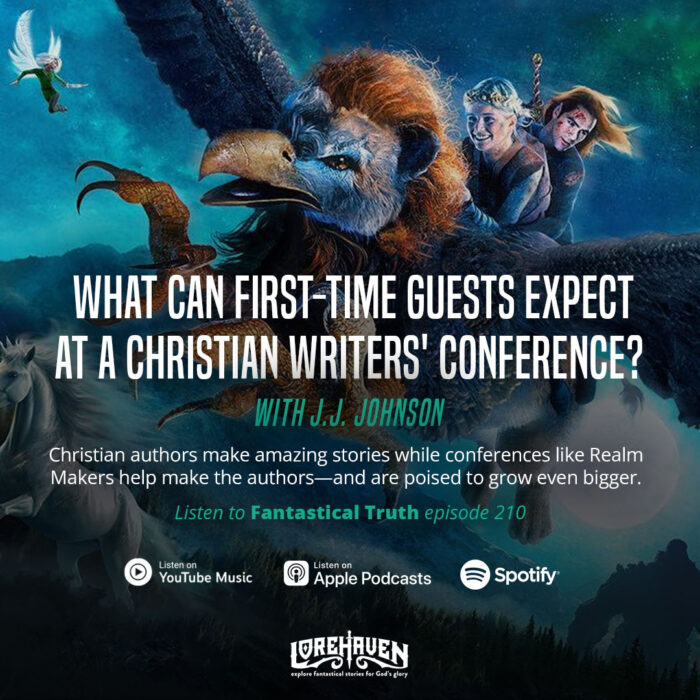Who Wants to Kill Christian Fiction?
So for those of us who just enjoy reading great stories (even better if they’re fantastical), and don’t keep up with all the bookmaking politics, here’s the scoop.1
Apparently the Christian Booksellers Association, or CBA, is getting a shakeup.
The case
Agent Steve Laube, a friend of SpecFaith (and Christian fantasy fans anywhere),2 first noted this yesterday:
Key staff people in CBA (aka Christian Booksellers Association) are no longer working for the association. In what appears to be a purge, Curtis Riskey, president for 11 years, is no longer working there.
Laube noted that CBA had not announced any transition or put out a press release.
Then Publishers Weekly did some checking and discovered this:
[Dallas-based entrepreneur Edward] Roush is drastically reorganizing the CBA’s staff and services in order to “build a trade association that is strong enough to meaningfully help the industry,” according to Deborah Mash, president of CBA Media, a subsidiary of CBA Service Corporation.
“CBA has been a poorly managed debt machine for many years, so Mr. Roush’s efforts to restructure the organization were imperative and unfortunately indicative of many of the problems in the industry as a whole,” Mash said in an email to PW.
Important comical fact: the outgoing president of the CBA’s last name is “Riskey.”
More important fact: the Christian Booksellers Association is long-running professional group that helps member Christian bookstores trade goods, including movies and books.” The CBA was formed in 1950.3 And lately it’s been struggling, like any business based on physical stores and traditional publishing in the 2010s.
Many news stories and blogs about failing regular bookstores, however, seem to lament the Passing of an Era. They’ll take shots at Amazon.com, or write clickbait-type articles with titles like “Millennials Are Ruining Mayonnaise and the Library.”
Yet with the Christian book industry, I wonder if some Christians could care less.
The charge
Here’s what I mean. When I see news about the CBA struggling or about a bookstore chain closing, or one agent’s 2017 predictions of market shrinking, the loudest reaction isn’t much like regret. If anything, a lot of people seem to gloat.
Narrowing this to books and then again to fiction books: If the news (rightly or wrongly) comes out—“Christian fiction is dying”—and people say, basically “Good riddance,” this arouses my suspicion. I want to know if they had any involvement with this potential crime. I want to put on my best outrageous Hercule Poirot mustache, adopt some hybrid Euro-accent, and drag in folks for questioning.
The suspects
So. Christian fiction appears to be dying. Where were you on the night of X?
“I was watching the latest prestige streaming drama on Netflix,” says the youthful Christian collegian and/or sort-of-hipster academic type. “Critics were really raving about this one. But I don’t read Christian fiction. Didn’t know it well—other than the fact that it is corny, sentimental, and bound by silly conservative rules.”
Really. Were you aware that (1) a service like Netflix started out offering abysmal streaming fare, which is an inevitable stage of a new media source’s early growth? (2) plenty of Christian fiction, with labels, content restrictions, and all, is actually awesome?
“Well, I just don’t prefer that mass-market Christian stuff no one’s ever heard of. I’d rather see TV shows that are esoteric and indie, which everyone’s talking about.”
So. Christian fiction appears to be dying. Where were you on the night of X?
“‘Christian fiction’?” guffaws a Millennial. “That still a thing? I read some when I was a kid. But it has all those rules. People in those books can’t even cuss! Let ‘em die.”
Stop to consider, my friend, that every medium has its own content restrictions, either as a matter of good taste or service to most of its diverse audience. Sure, on YouTube you can say the F-bomb all you like. But try dropping the N-bomb; it’ll blow up in your face.
“[Bomb] that. Reality isn’t real unless people are cussing. I’m all about really real reality with real things. Which means in the real world, everyone cusses all the time.”
So. Christian fiction appears to be dying. Where were you on the night of X?
“I left that behind—get it?—along with the conservative nonsense that ignores the Bible’s call to justice,” says the sober young activist Christian ministry leader. “Christian fiction does not actually help us connect with our neighbors. I prefer to engage secular fiction that helps me connect with them.”
So, the purpose of fiction is solely to help us evangelize people? Some Christian fiction also assumes that. You agree? You just think it doesn’t evangelize effectively?
“Keep talking. I’d like to write a blog about how Christian culture is just the worst.”
So. Christian fiction appears to be dying. Where were you on the night of X?
“‘Christian … fiction?’” says the middle-aged mother. “Oh. I only read Christian nonfiction about important things. Like about how there’s actually a secret code about the United States hidden in the book of Isaiah. Or about how small children actually take routine trips to paradise, and unlike the apostle Paul, are permitted to tell what they saw. Or about how I’m the hero of my own story, girl.”
Would you like to answer further questions with your attorney so you can avoid a possible future charge of perjury? You clearly stated you do not read “Christian fiction,” then proceeded to give several of your favorite examples of the same.
“Am I being detained? If not, then I must go. I’m late for my fellowship group about the new nonfiction book, Jesus Calling to Heaven is for Real So Wash Your Face.”
So. Christian fiction appears to be dying. Where were you on the night of X?
“Christian fiction,” sniffs the young conservative whippersnapper sort-of Calvinist preacher. “So we’re talking about that now? I haven’t been to a Christian bookstore in years. It’s full of not only terrible heresy but ridiculous kitsch. The music is carnal. The books are worse. They keep all the important, thick, historic theology books on the back shelf! In the very front they put out only the ridiculous stories for women and children. It’s all just fiction. All make-believe entertainment. Sure, that’s fine and maybe there’s nothing wrong with it—maybe—but in a world where the so-called churches are constantly compromising with the truth, we don’t need fantasy. We don’t need stories. We need God’s word. And by ‘God’s word,’ I mean preaching. Only preaching! Like the kind that I do. And like some of my friends do. Meanwhile, all these shallow people who claim to follow the gospel but instead get all distracted by this popular-culture nonsense and think that they can ‘exegete’ the world instead of expositing the—”
Sir. I doused you with truth serum when you weren’t looking. Who is your audience?
“My … audience?”
Yes. In your own imaginary world: who listens to you? Real people? Real people who like fiction? People could really benefit in their heads and their hearts from active, creative, thoughtful, excellent Christian fiction—the kind you refuse to support even in theory?
“N … no.”
No what?
“No, that’s not my audience.”
Who’s your imaginary audience, then?
“Other young pastors. Only other young pastors.”
Yep, we really need to scoff at that escapist, non-real-world fiction stuff.
“And only people who have the same personality as me, who only prefer nonfiction and doctrine and podcasts about preaching. Say, do you have any more of this truth serum? It’s quite relaxing. Being a young conservative whippersnapper sort-of Calvinist preacher is hard.”
I can imagine it is. (muttering to self) But it may go easier if you didn’t spend all your free time blogging against heresies.
“Hm? What’s that?”
Nothing.
“How could I … relax? Take a Sabbath rest … that would be really nice …”
As if God didn’t make humans to work seven days a week? To spend all our time teaching and evangelizing and whacking heretics? As if we actually do all those important things in anticipation of a day when we rest and enjoy adventures on New Earth under Jesus, our creator and King of all good imagination? Then here. Try this Christian novel.
- Lorehaven Magazine, and its guest writers, have been filling the space I’ve normally filled. Today I’m returning to Speculative Faith for a full guest article. I’ll try to share a later update about the magazine and my future writing plans. ↩
- Steve Laube is also the publisher of Enclave Publishing, an imprint of Gilead Publishing, which offers exclusively Christian-written fantasy, science fiction, and other speculative genre novels. ↩
- The CBA’s website says: “We are a long-standing international trade association who believes unity is imperative for Christian businesses – because it is a biblical mandate and because we are all more successful when we work together. Our mission is to supply vital connections, information, education, and encouragement to enable Christian product providers to reach all people.
“We support and connect the entire global Christian products industry, which includes retailers, suppliers, publishers, distributors, authors, artists, filmmakers and others. We value and support the widespread distribution of Bibles, Christian books, curriculum, apparel, music, videos, gifts, greeting cards, children’s resources, and other materials to communities worldwide.” ↩











































A bit invective, but still an awesome article with good insight and great examples. I’ve always said I don’t want to read Christian fantasy stories, I want to read fantasy stories written by Christians. I think people want to abandon the former, but they still confuse the two.
Great article! I think I’ve met a couple of these people . . .
There’s definitely some trends in Christian fiction I think should have run their course by now, but you know . . . if Beverly Lewis stops writing Amish books, I don’t know what I’ll get my mom for Christmas! (She’s also a big “Jesus Calling” fan — I got her the color book for her bday.)
That said, my local Christian bookstore closed over a decade ago, and it was more home decor and greeting cards than anything else, so . . .
I don’t think Christian fiction needs to die, but if it wants to be more than gifts for moms and grandmas it needs some growing pains.
I have enjoyed several authors who are published by the traditional houses —
Stephen Lawhead (also traditionally published),
Anne Elisabeth Stengl (went to own press, and now apparently traditionally published under another name??)
Patrick Carr
Ross Lawhead
And probably others that I can’t think of at the moment.
I wouldn’t like it if CBA disappeared, but it’s strange to act like Christian fiction will die if CBA dies. I mean, if that disappears, will that actually stop us from writing our own Christian fiction stories? It certainly won’t stop me, I write what I want to write and read. And we’ll all probably write more what the modern market wants anyway(not in a bad way), so more people might actually read ours, so our audience wouldn’t just be limited to amish fiction fans.
Yep. I agree with Autumn.
(Though I could add more to the thought, like–hopefully the CBA will be able to adapt to changing circumstances. But the CBA does not equal all Christian fiction.)
Agreed. But many folks, upon hearing of the CBA’s supposed demise, respond as if hurrah, good riddance, and the fewer “Christian products,” the better.
We’ll just have to take them by surprise with the Christian books we all write 😛
I prefer Indie Christian writers for the most part. No gate keepers to demand horrible work.
Must have a cheesy romance even if it’s irrelevant to the plot, must have a preachy moral, not just no sex but pretend the bad guys never have it or married people. No horrifying swears you call euphemisms–gee golly whillikers, holy smoke, or for crying out loud. (Pearl clutch!) Must lecture readers on the evils of smoking, playing cards, dancing, movies, and wearing lipstick.
Yes, I date myself. But this stuff is pretty recent. And–aside from The Left Behind series (shudder) and Frank Peretti no spec fiction would go beyond the slush pile.
Another thing I’ve seen is that things like sex is sometimes addressed in mainstream Christian fiction, but kinda oddly or not well.
There have been other mainstream Christian authors that have addressed lust a bit and did so reasonably ok. From what I remember, Bryan Davis has done that a couple times. Haven’t read all his books, so I can’t say if I agree with every depiction of mature topics he has, but he’s one of the authors that seems to have a reasonably ok balance.
Makes you wonder, if the author can’t write interesting things about sex, does that mean they have a terrible sex life?
I’m sure we could speculate irresponsibly and at length on this subject.
Yeah. I think part of the issue is them not having the practice with the actual writing part of it(just because people experience something doesn’t mean they can write it well). Also…when people try to dance around a subject then it tends to lead to weirdness and awkwardness.
At least it kind of shows people how not to write that stuff, though, or at least it’s shown me some pitfalls to avoid. I don’t write sex scenes, but sometimes I’ll show some things leading up to one, or how sexual matters have affected some of the characters and their society. Kinda wish more authors were willing to do that in a realistic way.
C.S. Lewis published his fiction with regular houses. But he wrote quality stuff. Ditto for Tolkien, Dorothy Sayers, and Flannery O’Connor.
Part of the reason the CBA developed wasn’t just that the darkness hated the light but people preferred quality fiction to frothy formula romances ground out by template. 95% of all novels in CBA bookstores I visited–when I visited them–were mindless, shallow romances.
With C S Lewis, part of me wonders if that was partly because religion was a bit less taboo at the time, so it was something even regular publishers may have been willing to publish? Now days there’s so much division between religious groups and secular groups that Christian fiction is now stuck in this little tiny faction where people feel like they have to cling to certain things even though those things may not be for the best.
Probably. But non Christians still enjoy some of his works today. (Not the fedora crowd! Lol.)
Thank You God for the phenomenon of Indy publishing. I appreciate it as a reader and a writer.